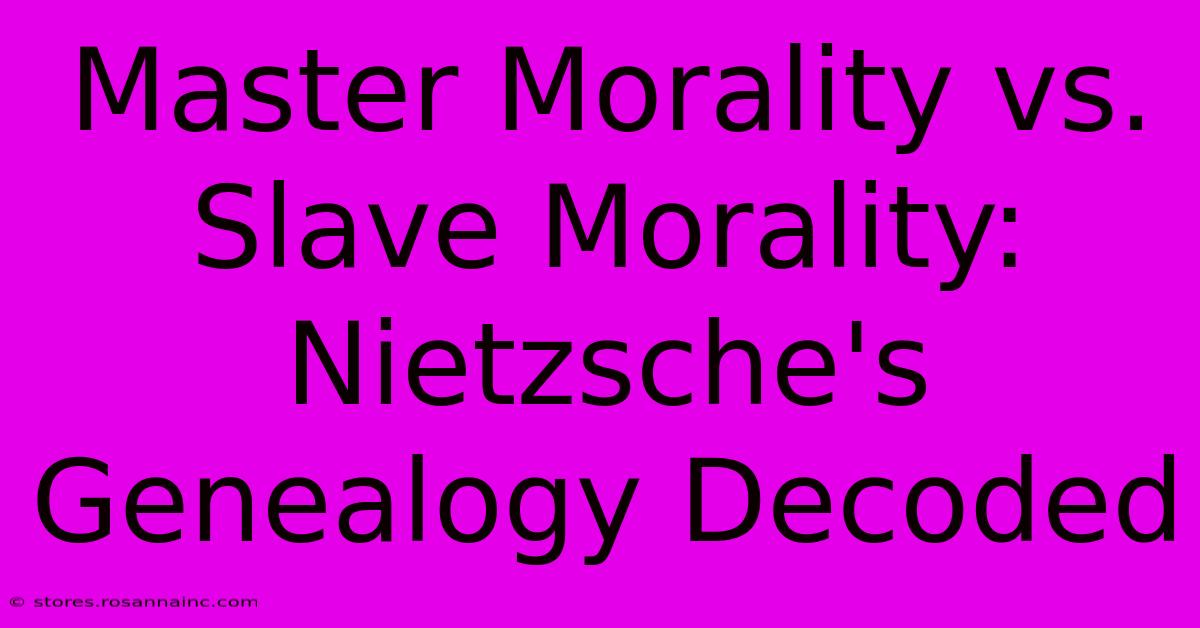Master Morality Vs. Slave Morality: Nietzsche's Genealogy Decoded

Table of Contents
Master Morality vs. Slave Morality: Nietzsche's Genealogy Decoded
Friedrich Nietzsche's concept of master-slave morality is a cornerstone of his philosophical work, particularly in On the Genealogy of Morality. It's a complex and often misinterpreted idea, so let's delve into its intricacies and unravel its enduring relevance. This exploration will decipher Nietzsche's genealogy, clarifying the distinctions and implications of these contrasting moral systems.
Understanding Nietzsche's Genealogy
Before diving into master and slave morality, it's crucial to understand Nietzsche's approach to morality itself. He rejected the notion of objective, universally valid moral principles. Instead, he proposed a genealogical approach, tracing the historical development of moral concepts to understand their origins and motivations. He argued that morality isn't a reflection of some inherent truth but rather a product of power dynamics and social forces.
The Birth of Master Morality
Nietzsche depicts master morality as arising from the powerful and noble classes. For them, good is synonymous with what they are: noble, strong, proud, and independent. Bad, conversely, is everything that contrasts with their own aristocratic virtues – the weak, the lowly, the cowardly. This isn't a judgment based on some abstract moral code; it's a simple affirmation of their own self-affirming values.
- Key Characteristics of Master Morality:
- Self-affirming: Values are based on inherent strength and nobility.
- Action-oriented: Emphasis on power, achievement, and self-overcoming.
- Proud and independent: Rejects external validation or moral constraints.
- Positive evaluation of self: "Good" is defined by what the master is.
The Rise of Slave Morality
Nietzsche argues that slave morality emerged as a reaction to master morality. The oppressed and downtrodden, unable to directly challenge the power of the masters, developed a different system of values. For them, good becomes associated with qualities that are the opposite of those valued by the masters: humility, meekness, and compassion. Bad is identified with the very attributes that define the master class: strength, pride, and self-assertion.
This, Nietzsche suggests, is a ressentiment, a resentment born out of powerlessness and a desire for revenge. By inverting the values of the masters, the slaves create a moral system that subtly undermines their oppressors.
- Key Characteristics of Slave Morality:
- Reactive: Values are defined in opposition to the master class.
- Other-directed: Emphasis on empathy, compassion, and humility.
- Focus on weakness: Values like meekness and forgiveness become virtues.
- Negative evaluation of self: "Good" is defined by what the master is not.
The Perversion of Values: A Critical Analysis
Nietzsche doesn't simply present these moralities as historical observations. He critiques the enduring influence of slave morality, arguing that it has become dominant in Western culture. He sees its emphasis on humility, compassion, and self-denial as ultimately life-denying forces, suppressing the will to power and the potential for human greatness. He doesn't advocate for a return to brutal master morality but rather cautions against the insidious effects of a morality that values weakness over strength.
Beyond the Dichotomy: Nuance and Complexity
It's vital to avoid a simplistic interpretation of Nietzsche's concept. He didn't intend to create a rigid binary opposition. His work is far more nuanced. He acknowledges that elements of both master and slave morality can coexist within individuals and societies. Furthermore, he suggests that the evolution of morality is an ongoing process, shaped by power struggles and the constant revaluation of values.
The Enduring Legacy of Nietzsche's Genealogy
Nietzsche's genealogy of morality remains highly relevant today. His insights offer a powerful critique of traditional moral systems, prompting us to examine the sources and motivations behind our values. His work encourages critical self-reflection, challenging us to consider the ways in which power dynamics and social structures shape our understanding of good and evil. By understanding the interplay of master and slave morality, we can gain a deeper appreciation of the complex and often contradictory nature of ethical thought. It prompts us to question the very foundations of our moral framework and encourages a reevaluation of what constitutes a truly fulfilling and meaningful life. The continuing discussion of Nietzsche's ideas ensures their lasting impact on philosophical and sociological thought.

Thank you for visiting our website wich cover about Master Morality Vs. Slave Morality: Nietzsche's Genealogy Decoded. We hope the information provided has been useful to you. Feel free to contact us if you have any questions or need further assistance. See you next time and dont miss to bookmark.
Featured Posts
-
Escape The Ordinary With Call Me By Your Name A Book Review
Feb 09, 2025
-
Investing In Your Future Bankers Hill Real Estate
Feb 09, 2025
-
Can Doubt Save A Life Jesse Stone Investigates
Feb 09, 2025
-
The Dr Death Dilemma How To Spot A Dangerous Doctor
Feb 09, 2025
-
Singapores Languages More Than You Think
Feb 09, 2025
